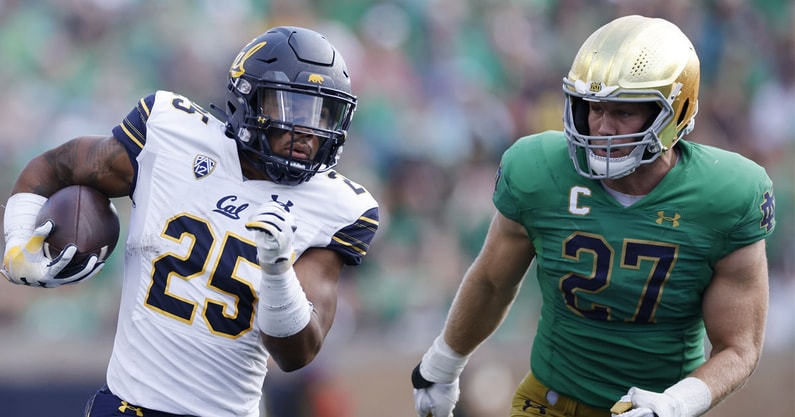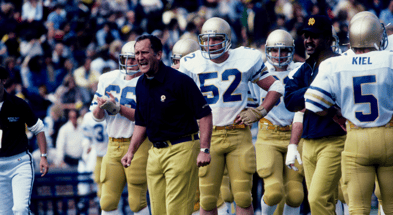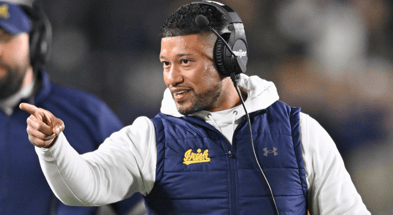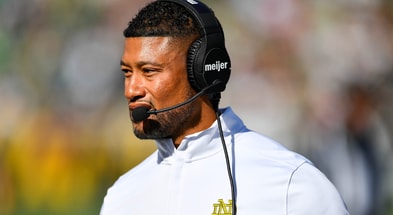Targeting penalty appeal rulings impact both sides of Notre Dame vs. BYU game

The targeting ejection appeal process instituted this offseason has impacted both sides of the Notre Dame vs. BYU game Saturday (7:30 p.m. ET, NBC). And not in a helpful way for the Irish.
Notre Dame head coach Marcus Freeman said Monday his appeal of senior linebacker JD Bertrand’s second-half targeting penalty Sept. 24 at North Carolina was denied. That means Bertrand’s first-half suspension for Saturday’s game will stand.
“In their opinion, that was a targeting penalty and they denied our appeal,” Freeman said. “He will be out for the first half.
“I’ll save my opinion. We felt like we had a strong appeal.”
Later that day, BYU’s Kalani Sitake told reporters an appeal of grad student cornerback Gabe Jeudy-Lally’s targeting ejection Sept. 29 vs. Utah State was successful, overturning the first-half suspension for Saturday.
“He was approved,” Sitake said. “Gabe will be playing in the first half.”
With both appeal rulings now final, one team regained a starter and the other confirmed it will not have a starter for two quarters. Bertrand has started three games for Notre Dame, making 18 tackles and 1.5 tackles for loss. Jeudy-Lally has 15 tackles and 1 pass breakup in five games this season. He started the two most recent contests, wins over Wyoming and Utah State.
Jeudy-Lally’s penalty came in the fourth quarter when he tackled Utah State wide receiver NyNy Davis for a 3-yard loss. It was not called targeting on the field. A booth-initiated review of the play, though, led to the penalty.
“It’s a tough situation,” ESPN analyst Louis Riddick said during the game broadcast. “For defenders, you have to lower your target point. You’re just going to have to take shots down near the knees. It’s almost impossible to hit with force and keep your head back to the point where it doesn’t have any kind of contact. The crown of your helmet won’t hit, and that’s why you see so many defenders tackling low and going for the knees.
“Tackles are going to going to go lower and lower, and you’re going to run the risk of ball carriers getting their knees taken out.”
The targeting penalty on Bertrand was his second in as many games. The first one came in the final minute of the Sept. 17 win over Cal on a play away from the ball. It wiped out what would have been a game-sealing interception from Notre Dame cornerback Clarence Lewis.
One week later, he was flagged for targeting when he tackled North Carolina tight end Bryson Nesbit on a 23-yard reception early in the fourth quarter. ESPN analyst Dan Orlovsky, the color commentator in the game, blasted the call.
Top 10
- 1Breaking
Dylan Raiola injury
Nebraska QB will play vs. USC
- 2
Elko pokes at Kiffin
A&M coach jokes over kick times
- 3New
SEC changes course
Alcohol sales at SEC Championship Game
- 4
Bryce Underwood
Michigan prepared to offer No. 1 recruit $10.5M over 4 years
- 5Trending
Dan Lanning
Oregon coach getting NFL buzz
“I can’t disagree more,” Orlovsky said. “I think it’s an awful call. He hits him – I can see the stickers on the back of the helmet – first contact is made from his facemask right onto the right shoulder of Nesbit. I’m happy Nesbit is fine. It’s a phenomenal catch. There was no crown of the helmet and no contact on his neck or head. I think it’s a horrible call.”
RELATED: More Notre Dame football:
• Why Notre Dame is set up for the first ranked win of the Marcus Freeman era vs. BYU
• Commit tracker: Notre Dame football recruits in action
Freeman, though, did not have any interest in pushing back on the call when asked to address it after the game. He appeared more miffed that Bertrand was flagged for it two games in a row.
“It’s targeting,” Freeman said. “And you can argue all you want, but as I told JD on the field, it’s our job to learn from that situation. It’s an entire game he has missed now. He missed the first half of this game, and he’s going to miss the first half of the next game.
“We have to learn from it. We have to change, or you’re going to continue to get targeting penalties, no matter if we agree or disagree.
“We have to practice different ways to tackle it. You’ve got to make sure you’re not leading with your head. One is safety. But two, you need to be on the field. We have to look at that and study and say, ‘How would we practice for him in particular a better way to make sure that doesn’t happen again?’”
The NCAA passed an addendum to the targeting rule in April that allowed teams to appeal the first-half ejection of a subsequent game that stems from a second-half targeting penalty. The appeals are directed to the NCAA national coordinator of officials.
“If it is obvious that a player was incorrectly penalized for targeting, the call would be overturned,” the NCAA rule reads.

























